|
...............................
......................
...............................
Cyrus The Great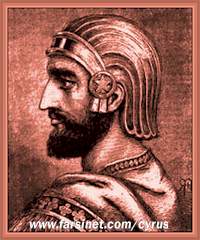 Cyrus (580-529 BC) was the first Achaemenid Emperor. He founded Persia by uniting the two original Iranian Tribes- the Medes and the Persians. Although he was known to be a great conqueror, who at one point controlled one of the greatest Empires ever seen, he is best remembered for his unprecedented tolerance and magnanimous attitude towards those he defeated. Cyrus (580-529 BC) was the first Achaemenid Emperor. He founded Persia by uniting the two original Iranian Tribes- the Medes and the Persians. Although he was known to be a great conqueror, who at one point controlled one of the greatest Empires ever seen, he is best remembered for his unprecedented tolerance and magnanimous attitude towards those he defeated. Upon his victory over the Medes, he founded a government for his new kingdom, incorporating both Median and Persian nobles as civilian officials. The conquest of Asia Minor completed, he led his armies to the eastern frontiers. Hyrcania and Parthia were already part of the Median Kingdom. Further east, he conquered Drangiana, Arachosia, Margiana and Bactria. After crossing the Oxus, he reached the Jaxartes, where he built fortified towns with the object of defending the farthest frontier of his kingdom against nomadic tribes of Central Asia. The victories to the east led him again to the west and sounded the hour for attack on Babylon and Egypt. When he conquered Babylon, he did so to cheers from the Jewish Community, who welcomed him as a liberator- he allowed the Jews to return to the promised Land. He showed great forbearance and respect towards the religious beliefs and cultural traditions of other races. These qualities earned him the respect and homage of all the people over whom he ruled. | 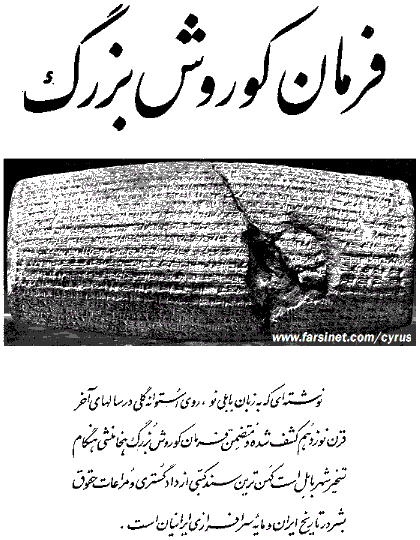
Charter of the Rights of Nations
Inscribed on a clay cylinder in cuneiform
discovered in 1879 now in The British Museum, London. | 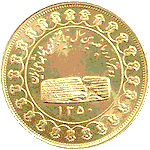
|
|---|
After victory over Babylonia, Cyrus The Great presented himself not as a conqueror, but a liberator and the legitimate successor to the crown. He took the title of "King of Babylon and King of the Land". Cyrus had no thought of forcing conquered people into a single mould, and had the wisdom to leave unchanged the institution of each kingdom he attached to the Persian Crown. In 537 BC he allowed more than 40,000 Jews to leave Babylon and return to Palestine. He also declared the first Charter of Human Rights known to mankind, which is written on a clay cylinder: "I am Cyrus, king of the world, great king, mighty king, king of Babylon, king of the land of Sumer and Akkad, king of the four quarters, son of Cambyses, great king, king of Anshan, grandson of Cyrus, great king, king of Anshan, descendant of Teispes, great king, king of Anshan, progeny of an unending royal line, whose rule Bel and Nabu cherish, whose kingship they desire for their hearts' pleasures. When I, well-disposed, entered Babylon, I established the seat of government in the royal palace amidst jubilation and rejoicing. Marduk, the great God, caused the big-hearted inhabitants of Babylon to...me. I sought daily to worship him. My numerous troops moved about undisturbed in the midst of Babylon. I did not allow any to terrorize the land of Sumer and Akkad. I kept in view the needs of Babylon and all its sanctuaries to promote their well-being. The citizens of Babylon... I lifted their unbecoming yoke. Their dilapidated dwellings I restored. I put an end to their misfortunes. At my deeds Marduk, the great Lord, rejoiced, and to me, Cyrus, the king who worshipped, and to Cambyses, my son, the offspring of my loins, and to all my troops, he graciously gave his blessing, and in good spirit is before him we/glorified/exceedingly his high divinity. All the kings who sat in the throne rooms, throughout the four quarters, from the Upper to the Lower Sea, those who dwelt in ... all the kings of the West Country who dwelt in tents, brought me their heavy tribute and kissed my feet in Babylon. From ... to the cities of Ashur and Susa, Agade, Eshnuna, the cities of Zamban, Meurnu, Der, as far as the region of the land of Gutium, the holy cities beyond the Tigris whose sanctuaries had been in ruins over a long period, the Gods whose abode is in the midst of them. I returned to the places and housed them in lasting abodes. I gathered together all their inhabitants and restored to them their dwellings. The Gods of Sumer and Akkad whom Nabonidus had, to the anger of the Lord of the Gods, brought into Babylon, I at the bidding of Marduk, the great Lord made to dwell in peace in their habitations, delightful abodes. May all the gods whom I have placed within their sanctuaries address a daily prayer in my favour before Bel and Nabu, that my days may long, and may they say to Marduk my Lord, May Cyrus the King who reveres thee, and Cambyses his son ..."
| Language: |
Akkadian |
| Medium: |
clay cylinder |
| Size: |
23 cm long
11 cm wide |
| Length: |
40+ lines of writing
(although broken) |
| Genre: |
|
| Date: |
538 BCE |
| Cyrus's reign: |
557-529 BCE |
| Place of Discovery: |
Nineveh, Iraq |
| Date of Discovery: |
1879
|
| Discoverer: |
Hormuzd Rassam |
| Current Location: |
British Museum |
| Inventory number: |
BM WAA 90920
(BM = British Museum;
WAA = Western Asiastic Antiquities) | |
The British Museum has announced that after the planned "Persian Empire Gallery in 2005", the Charter of the Rights of the Nations, known as Cyrus Charter of Rights of Nations Cylinder, will be loaned to the National Museum of Iran for three months.
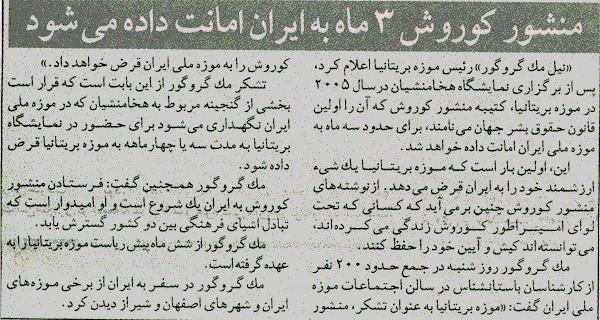
Cyrus the Great Became Top Leader Of His Era By Championing Just Rule
King Cyrus a Just RulerThursday, July 16, 1998
Investor's Business Daily
Leaders & Success Column
By Matthew Benjamin When the conqueror Cyrus the Great rode into Babylon, the city's vanquished erupted in cheers. Yes, they'd have to bend to his rule. But Cyrus (580-530? B.C.) made sure that wouldn't be difficult. In contrast to other rulers of his day, he was just. In fact, his style of government was a critical factor in his becoming the greatest ruler of his time. Cyrus' Persian Empire, which extended from India to the Mediterranean Sea, was the most powerful state in the world until its conquest two centuries later by Alexander the Great. Cyrus was born to nobility in a small highland tribe, the Achaemenians, in central Persia. The tribe paid tribute to several regional kingdoms, including Media to the west and Babylonia to the south. Cyrus' father was a minor king who was venerated in his own lands but became utterly humble when he visited his more powerful neighbors to take tributes of wild horses.  Once when young Cyrus went on such a trip to Media, he was bewildered by his father's reduction in stature. More disturbing to him, however, was the great cruelty of the Median king, Astyages. According to one account, Cyrus saw
Astyages slay his own general's son as punishment for the general's minor misdeed. That same general later betrayed Astyages, causing the king to lose his authority and possessions. Such instances taught Cyrus that cruelty and humiliation were not effective. He decided he would govern through conciliation instead. Cyrus' first military conquest was of Media in 550 B.C. One of his first acts was to do away with the draconian tradition that would have had him raze the city and murder its citizens enmasse. Cyrus appointed a Mede as chief adviser and then ruled the kingdom in a kind of dual monarchy, with both Medes and Persians holding high offices. The satrapy, as this system of government became known, put a native Mede in power as a semiautonomous ruler, or satrap. Cyrus instituted certain checks, though. Foe example, several of the satrap's underlings reported directly to Cyrus. "Nevertheless, the close relationship between Persians and Medes was never forgotten. Medes were honored equally with Persians; they were employed in high office and were chosen to lead Persian armies," wrote A.T. Olmstead in his "History of the Persian Empire." From Media, Cyrus went on to conquer the western land of Lydia and several Greek states on the Aegean Sea. He then turned east, taking the ancient kingdom of Drangiana, Arachosia, Margiana and Bactria. He converted most into satrapies and put natives in command. He also showed great respect for conquered peoples' religious and cultural beliefs. At that time, every tribe or kingdom had its own gods and rites. While it was customary for conquerors to deface the idols and religious statues of those they defeated, Cyrus forbade that practice. When it did occur, he quickly remedied it. "Large numbers of foreign captive divinities gave further opportunity for royal benevolence," Olmstead wrote. That earned him the respect and homage of the races over whom he ruled. Cyrus' biggest conquest was Babylonia, a wildly rich and powerful kingdom in the fertile crescent between the Tigris and Euphrates rivers. It was, however, in decline. Babylonian king Nabu-naid was unpopular with many segments of his population. He had alienated the high priests and captured and enslaved ten of thousands of Jews. Cyrus took Babylon, the greatest city of the ancient world, in 539 B.C. He did so to the cheers of its citizens, who welcomed him as ruler because of word of his just treatment. He lived up to that reputation, freeing more than 40,000 enslaved Jews and allowing them to return to Palestine. He is mentioned 22 times in the Bible for these and similar deeds. Cyrus always took pains to convey that he was not a foreign king and conqueror, but a liberator and, therefore, a legitimate holder of the crown. For example, after conquering Babylon, he immediately addressed its citizens in their own language and added "King of Babylon" to the top of his long list of titles. It was an unheard of gesture of respect. "In the eyes of his Babylonian subjects, Cyrus was never an alien king," Olmstead wrote. "The proclamation of Cyrus to the Babylonians, issued in their own language, was a model of persuasive propaganda." He also left in place most of the existing government and allowed most midlevel officials to retain their positions. Cyrus was a great learner. He observed the customs and traditions of the cultures he conquered and made sure the best elements were put to use for all of Persia's benefit. Cyrus invented, or appropriated and improved upon, the idea of the postal system, according to the Greek historian Xenophon. Figuring out how far a horse could travel in one day, Cyrus built a series of posting stations, each one day's ride apart, across his empire. The system ensured the efficient flow of information between him and his satraps. 
"I am Cyrus, who founded the empire of the Persians.
Grudge me not therefore, this little earth that covers my body." 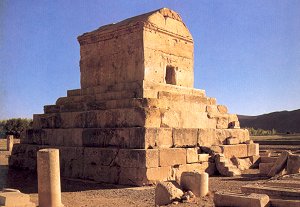 " O, man, whoever thou art and whensesoever thou comest, for I know that thou wilt come, I am Cryus, and I won f or the Persians their empire. Do not, therefore, begrudge me this little earth which covers my body. |
|---|
HISTORY OF PERSIA(IRAN): THE FIRST CHART OF HUMAN RIGHTS, THOUSANDS OF YEARS BEFORE THE AMERICAN UNITED NATIONS IN NEW YORK,USA:
 |
Cyrus Charter of Human Rights
Edited by: Shapour Suren-Pahlav
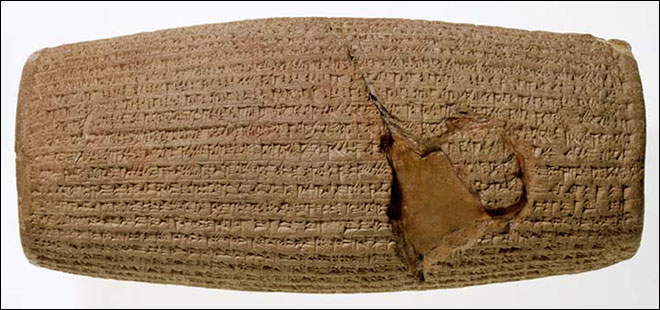 |
Cyrus Cylinder,
The First Charter of Human Rights |
he charter of Cyrus the Great, a baked-clay Aryan language (Old Persian) cuneiform cylinder, was discovered in 1878 in excavation of the site of Babylon. In it, Cyrus the Great described his human treatment of the inhabitants of Babylonia after its conquest by the Iranians.
The document has been hailed as the first charter of human rights, and in 1971 the United Nations was published translation of it in all the official U.N. languages. "May Ahura Mazda protect this land, this nation, from rancor, from foes, from falsehood, and from drought". Selected from the book "The Eternal Land". This is a confirmation that the Charter of freedom of Humankind issued by Cyrus the Great on his coronation day in Babylon could be considered superior to the Human Rights Manifesto issued by the French revolutionaries in their first national assembly. The Human Rights Manifesto looks very interesting in its kind regarding the expressions and composition, but the Charter of Freedom issued twenty three centuries before that by the Iranian monarch sounds more spiritual. Comparing the Human Rights Manifesto of the French National Assembly and the Charter approved by the United Nations with the Charter of Freedom of Cyrus, the latter appears more valuable considering its age, explicitness, and rejection of the superstitions of the ancient world. Cyrus the Great entered the city of Babylon in 539 BCE, and after the winter, on the first day of spring, he was officially crowned: My numerous troops moved about undisturbed in the midst of Babylon. I did not allow anyone to terrorise the land of Sumer and Akkad. I kept in view the needs of Babylon and all its sanctuaries to promote their well being. The citizens of Babylon ................. I lifted their unbecoming yoke. Their dilapidated dwellings I restored. I put an end to their misfortunes. The description of the coronation of Cyrus is the most elaborate one in the world written by the Greek philosopher, politician, and historian Xenephon (Cyropaedia of Xenophon, The Life of Cyrus The Great). On the day of coronation, Cyrus read the Charter of Freedom out after he put on the crown with his hand in Marduk Temple. Uncertain and the full text of the Charter was unavailable until an inscription was foundering the excavation works in the old city of Ur in Mesopotamia. After the translation of the words, it was found out that the document was the same Charter. It is now kept in the British Museum and it is no exaggeration to say that it is one of the most precious historical records of the world.
In the Charter, after introducing himself and mentioning the names of his father, first, second, and third ancestors, Cyrus says that he is the monarch of Iran, Babylon, and the four continents: I am Kourosh (Cyrus), King of the world, great king, mighty king, king of Babylon, king of the land of Sumer and Akkad, king of the four quarters, son of Camboujiyah (Cambyases), great king, king of Ansh, grandson of Kourosh (Cyrus), great king, king of Ansh, descendant of Chaish-Pesh (Teispes), great king, king of Ansh, progeny of an unending royal line, whose rule Bel and Nabu cherish, whose kingship they desire for their hearts, pleasure. When I well -disposed, entered Babylon, I set up a seat of domination in the royal palace amidst jubilation and rejoicing. Marduk the great god, caused the big-hearted inhabitations of Babylon to .................. me, I sought daily to worship him. He continues: At my deeds Marduk, the great lord, rejoiced and to me, Kourosh (Cyrus), the king who worshipped him, and to Camboujiyah (Cambyases), my son, the offspring of (my) loins, and to all my troops he graciously gave his blessing, and in good sprit before him we glorified exceedingly his high divinity. All the kings who sat in throne rooms, throughout the four quarters, from the Upper to the Lower Sea, those who dwelt in ..................., all the kings of the West Country, who dwelt in tents, brought me their heavy tribute and kissed my feet in Babylon. From ... to the cities of Ashur, Susa, Agade and Eshnuna, the cities of Zamban, Meurnu, Der as far as the region of the land of Gutium, the holy cities beyond the Tigris whose sanctuaries had been in ruins over a long period, the gods whose abode is in the midst of them, I returned to their places and housed them in lasting abodes. I gathered together all their inhabitations and restored (to them) their dwellings. The gods of Sumer and Akkad whom Nabounids had, to the anger of the lord of the gods, brought into Babylon. I, at the bidding of Marduk, the great lord, made to dwell in peace in their habitations, delightful abodes. May all the gods whom I have placed within their sanctuaries address a daily prayer in my favour before Bel and Nabu, that my days may be long, and may they say to Marduk my lord, "May Kourosh (Cyrus) the King, who reveres thee, and Camboujiyah (Cambyases) his son ..." And: Now that I put the crown of kingdom of Iran, Babylon, and the nations of the four directions on the head with the help of (Ahura) Mazda, I announce that I will respect the traditions, customs and religions of the nations of my empire and never let any of my governors and subordinates look down on or insult them until I am alive. From now on, till (Ahura) Mazda grants me the kingdom favor, I will impose my monarchy on no nation. Each is free to accept it , and if any one of them rejects it , I never resolve on war to reign. Until I am the king of Iran, Babylon, and the nations of the four directions, I never let anyone oppress any others, and if it occurs , I will take his or her right back and penalize the oppressor. And until I am the monarch, I will never let anyone take possession of movable and landed properties of the others by force or without compensation. Until I am alive, I prevent unpaid, forced labor. To day, I announce that everyone is free to choose a religion. People are free to live in all regions and take up a job provided that they never violate other's rights. No one could be penalized for his or her relatives' faults. I prevent slavery and my governors and subordinates are obliged to prohibit exchanging men and women as slaves within their own ruling domains. Such a traditions should be exterminated the world over. I implore to (Ahura) Mazda to make me succeed in fulfilling my obligations to the nations of Iran (Persia), Babylon, and the ones of the four directions. | |
.........................
|
Click on the picture above to get to my other website,thanks.
............................
We begin the information on the GREAT ARYAN NATION, THE PERSIAN heritage that America won't show you on its television stations or other media:
| The charter of Cyrus the Great, a baked-clay Aryan language (Old Persian) cuneiform cylinder, was discovered in 1878 in excavation of the site of Babylon. In it, Cyrus the Great described his human treatment of the inhabitants of Babylonia after its conquest by the Iranians. The document has been hailed as the first charter of human rights, and in 1971 the United Nations was published translation of it in all the official U.N. languages. "May Ahura Mazda protect this land, this nation, from rancor, from foes, from falsehood, and from drought". Selected from the book "The Eternal Land". I am Cyrus.
King of the world. When I entered Babylon... I did not allow anyone to terrorise the land... I kept in view the needs of Babylon and all its sanctuaries to promote their well-being... I put an end to their misfortune. From The First Charter of the Rights of Nations Cyrus, The Great, 539 B.C.
Founder of The First Persian Empire |
SOURCE: http://www.farsinet.com/cyrus/
...........................
|




![]()

